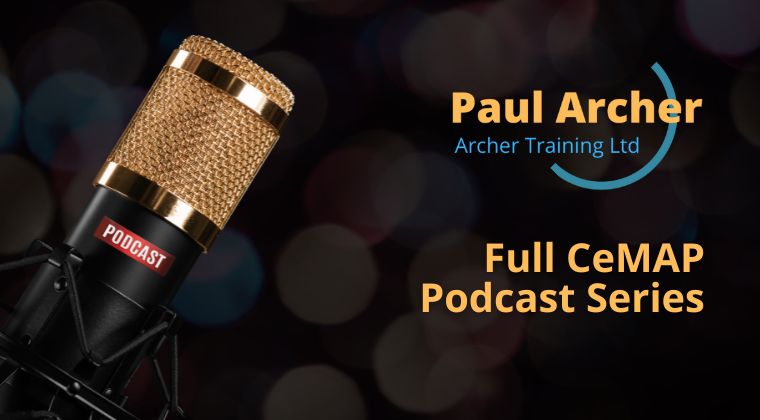-
1. The UK Mortgage Marketplace, Definitions and Types of Mortgage. Paul spends 44 minutes chatting with you about the UK mortgage market to start your studies. Beginning with defining what a mortgage is legally speaking, then onto a snapshot of the residential mortgage market since the 1980s. Then Paul describes the mortgage marketplace – the players, lenders, brokers – with a session on how mortgages are funded. A quick review of the financial crash and its causes finishes with a look at how brokers operate in the market—finally, a study and a forecast on the property and mortgage markets and where they might be going.
-
2. Types of Borrowers, Mortgage Regulation, Other Legal Aspects. Paul speaks for 37 minutes on types of borrowers that may approach you and those that are ineligible that you may struggle to arrange mortgages. Then, he launches into mortgage regulation with an overview of MCOBs and an introduction to how mortgages were regulated from 2004 onwards. Miscellaneous laws that affect the mortgage market are then discussed, with a few being a summary because you would have covered them in CeMAP 1.
-
3. Mortgage Conduct of Business Rules - Part 1 - Overview plus MCOBs 3 and 4. Paul recorded some livestreams during the summer on all of the MCOBs in detail. So you could enjoy them as podcasts, he made the recordings available here as audio. If you want to see the videos, YouTube is your destination www.paularcher.tv. This recording covers an overview plus MCOBs 3 and
-
4. Mortgage Conduct of Business Rules - Part 2 - MCOBs 6, 7, 11 and 13. Paul continues his livestreams, but this time, deep diving into MCOBS 6, 7, 11 and 13. These are important and cover disclosure from lenders, responsible lending, arrears, and repossessions. As you know, the MCOBs affect the lending and advice risks equally. If you want to see the videos, YouTube is your destination www.paularcher.tv
-
5. Legal Aspects of Property and Ownership. Paul spends 45 minutes discussing the various forms and intricacies of property ownership in the UK. We have varying property laws north and south of the border, so Paul describes them all. Property tenure, covenants, titles, and land registry are all dissected, and the relevance to lending is highlighted each time. After all, you're not training to be a property lawyer; you want to become a professional mortgage broker and adviser. Understanding property law will allow you to talk to your client confidently, knowing how ownership affects mortgage ability.
-
6. Buying a Property and Conveyancing Aspects. Paul spends around 38 minutes chatting about buying and selling property in the UK. He refers mainly to England and Wales law but mentions the Scots process, too. The conveyancing process, auctions, estate agents and mortgage brokers. The solicitor's role, especially with searches and contracts, is covered. Fees in buying and selling are emphasised, and we finish with the mortgage offer and deed conditions.
-
7. Assessing the Mortgage Applicant and Additional Security. Paul spends 36 minutes chatting through how we assess a mortgage applicant for a mortgage—looking at types of income, affordability guidelines and credit scoring—a mention of DIPs, capacity reports and CCJs. Finally, Paul discusses additional security by summarising the old Higher Lending Charges and how the mortgage lending market has moved on with self-insuring and government guarantee assistance. Guarantors finish off the session.
-
8. Property Defects, Assessing the Property and Surveys. For 40 minutes, Paul takes time to chat through the vital role the mortgage adviser must fulfil before submitting the mortgage application. That is to determine whether the property will be suitable security for a mortgage and whether the lender's criteria accept the property. All should be fine once the green light has been given for submitting an application. Paul then chats through the various survey options and the survey results. So he'll look at surveys, reports, the condition of the property, retentions and undertakings and the other specialist reports often needed.
-
9. Mortgage Protection - State Welfare Benefits. Touched upon in CeMAP 1, so you will recall some of these. Suppose you've forgotten, or your CeMAP 1 was taken long ago. In that case, Paul talks about the significant benefits advisers should know.
-
10. Customer Protection Needs and Mortgage Life Assurance. Paul talks about mortgage protection for around 30 minutes in this podcast episode. Starting with a "warm up" on needs and consequences of not protecting, a glance at life stages and priorities. Then, it's a deep dive into the types of mortgage life protection plans - term assurances. A look at relevant life assurance plans for your limited company directors and, finally, a reminder of the need for trusts and how to put them together with customers.



